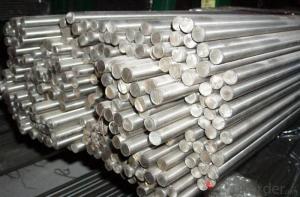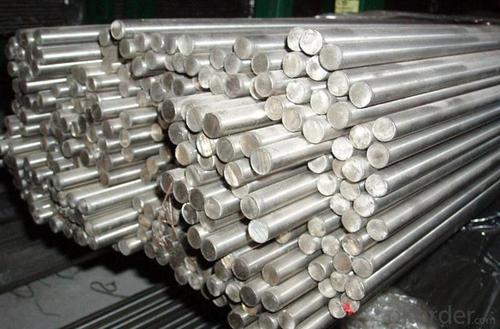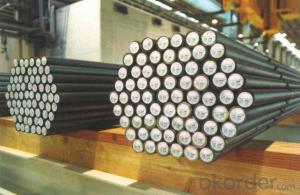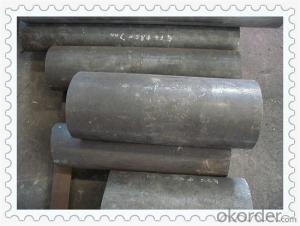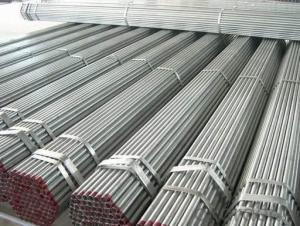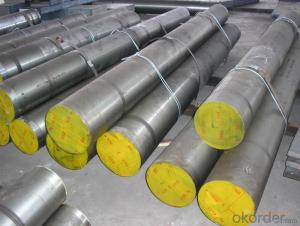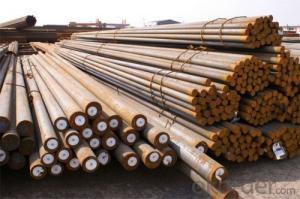Alloy AISI 4140 Material Steel Round Bars
- Loading Port:
- Tianjin
- Payment Terms:
- TT OR LC
- Min Order Qty:
- 25 m.t.
- Supply Capability:
- 50000 m.t./month
OKorder Service Pledge
OKorder Financial Service
You Might Also Like
Specification
Alloy AISI 4140 Material Steel Round Bars
Product Description:
1.Dia:16-320mm
2.Length:4-12m(can be customized)
3.Proceesing :EAF+LF+VD
4.Inspection: Ultrasonic according to the test standards:SEP1921-84,GR.3 CLASS C/C
5. Packing situation: standard seaworthy packing or as customer required
6. Delivery time: 7 days for stock and 30 days for new production
7. Payment: T/T, or L/C at sight.
Chemical Composition:
Grade | C | Si | Mn | P | S | Cr | Mo |
42CrMo4 | 0.38-0.45 | 0.17-0.37 | 0.40-0.70 | ≤0.035 | ≤0.035 | 0.90-1.20 | 0.15-0.25 |
1.7225 | 0.38-0.45 | ≤0.40 | 0.60-0.90 | ≤0.025 | ≤0.035 | 0.90-1.20 | 0.15-0.30 |
4140 | 0.38-0.43 | 0.15-0.35 | 0.75-1.00 | ≤0.035 | ≤0.040 | 0.80-1.10 | 0.15-0.25 |
Aplication:
(1) Generally used for producing the important parts with high strength and good plastic.
(2) After nitrogen treatment, used for producing the important parts with special performance
requirements, such as shafts, gears, fasteners, bolt of large dia steamer etc.
Alloy steel bars are highly appreciated for its striking fetures such as resilient, fine finish, optimum tensile strength and corrosion resistant. We fabricate these products using optimum quality materials based on well versatile technology in complying with the quality standards. These products are widely used in various construction, automobiles and mechanical parts.
Product Show:
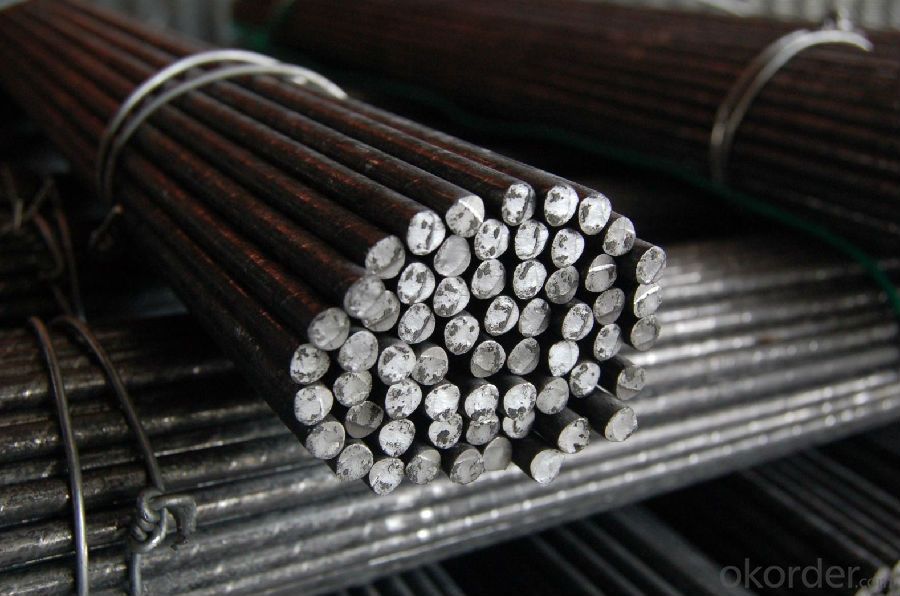
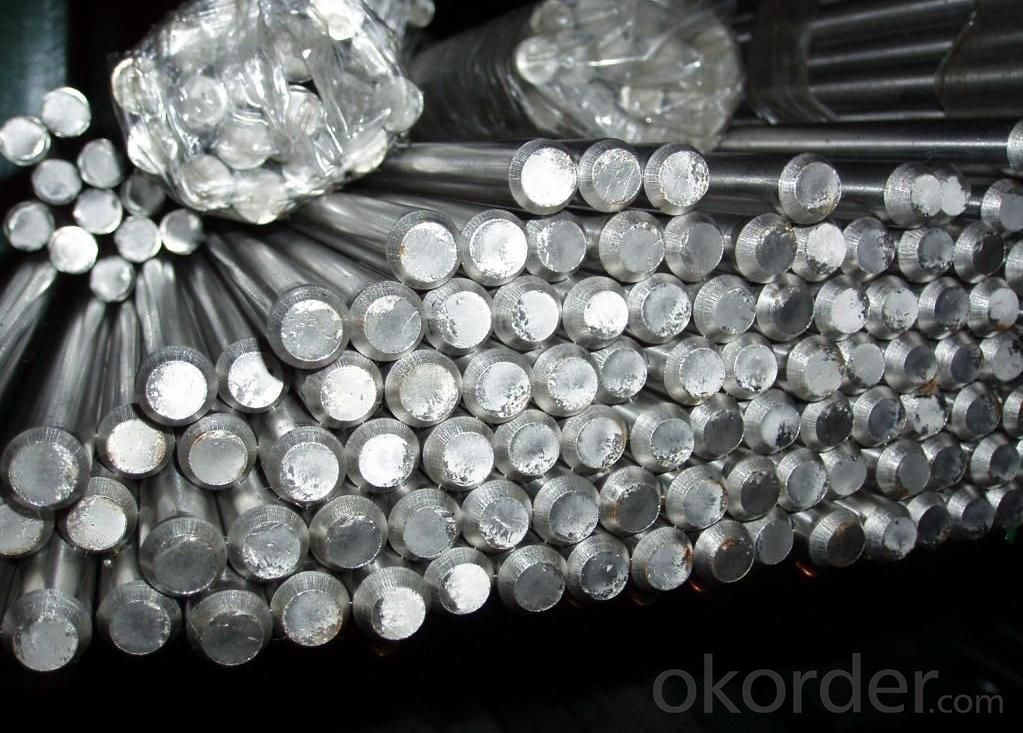
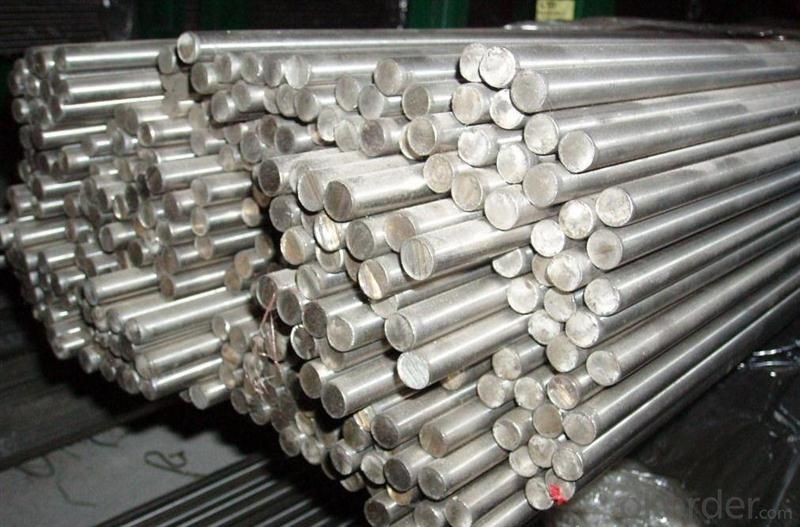
- Q: How does special steel ensure product traceability?
- Special steel ensures product traceability through various measures and processes implemented throughout its production and supply chain. Firstly, special steel manufacturers maintain detailed records of the production process, including the source of raw materials, the specific production techniques used, and the testing and inspection procedures conducted at each stage. These records allow for complete traceability, as they provide a clear history of each product from its inception to the final product. Special steel manufacturers also implement robust quality control systems, which include unique identification codes or markings assigned to each product. These codes help in tracking the product throughout its life cycle, enabling easy identification and traceability. In addition, special steel manufacturers often rely on advanced technology systems such as barcode scanning, radio frequency identification (RFID), or blockchain to track and trace their products. These systems enable real-time monitoring and recording of product movements, ensuring accurate traceability and transparency. Furthermore, special steel manufacturers maintain strong relationships with their suppliers and customers, ensuring that the entire supply chain is transparent and traceable. They collaborate closely with suppliers to validate the origin and quality of raw materials, and they work closely with customers to provide them with detailed information about the product's manufacturing process and its journey through the supply chain. Overall, special steel manufacturers prioritize product traceability by implementing strict record-keeping systems, advanced technology solutions, and maintaining transparent relationships with suppliers and customers. These measures not only ensure the quality and reliability of the special steel products but also provide customers with assurance regarding the origin and authenticity of the product.
- Q: What are the environmental impacts of manufacturing special steel?
- Manufacturing special steel has significant environmental impacts due to its energy-intensive production process and the extraction of raw materials. The production of special steel requires high temperatures and uses large amounts of fossil fuel-based energy, resulting in substantial greenhouse gas emissions contributing to climate change. Additionally, the extraction of iron ore and other raw materials for steel production can lead to deforestation, habitat destruction, and water pollution. The disposal of steel waste and byproducts also poses challenges, as it can contaminate soil and water sources. Therefore, the environmental impacts of manufacturing special steel must be carefully managed and mitigated through sustainable practices and technologies.
- Q: What are the different methods for improving the electrical conductivity of special steel?
- There are several methods for improving the electrical conductivity of special steel. One common method is through the addition of alloying elements such as copper or silver. These elements can help to increase the number of free electrons in the steel, thereby improving its electrical conductivity. Another method is by subjecting the steel to heat treatment processes such as annealing or normalizing. These heat treatments can help to refine the microstructure of the steel, reducing the presence of impurities and enhancing the movement of electrons. Surface treatments, such as electroplating or coating the steel with a conductive material like copper or nickel, can also improve its electrical conductivity. These treatments create a conductive layer on the surface of the steel, enabling better electron flow. Additionally, refining the grain size of the steel through processes like grain boundary engineering or severe plastic deformation can improve its electrical conductivity. Smaller grain sizes allow for more efficient electron movement and reduce scattering, leading to enhanced conductivity. Lastly, proper cleaning and removal of any surface contaminants or oxides can significantly improve the electrical conductivity of special steel. By removing impurities and ensuring a clean surface, the steel can have better contact and conductivity. It is important to note that the specific method used to improve the electrical conductivity of special steel will depend on the intended application and the desired level of conductivity. Different industries and applications may require different approaches to achieve the desired results.
- Q: How is alloy steel used in the production of gears and shafts?
- Alloy steel is commonly used in the production of gears and shafts due to its excellent combination of strength, durability, and resistance to wear and corrosion. The alloying elements such as manganese, chromium, nickel, and molybdenum enhance the properties of the steel, making it suitable for high-stress applications. The use of alloy steel in gears and shafts ensures their ability to withstand heavy loads, transmit power efficiently, and maintain dimensional stability under extreme operating conditions, thus increasing the overall lifespan and performance of the components.
- Q: What are the different corrosion protection methods used for special steel?
- To ensure the durability and longevity of special steel, various methods are employed for corrosion protection. These methods encompass: 1. Coatings: The application of diverse coatings, including paint, epoxy, or zinc, creates a protective layer on the steel surface. Such coatings function as barriers, preventing direct contact between moisture, corrosive elements, and the steel. 2. Galvanization: By coating the steel with a layer of zinc through the process of galvanization, a sacrificial barrier is formed wherein the zinc corrodes instead of the steel. Galvanized steel is commonly utilized in outdoor applications such as fences, poles, and roofing. 3. Stainless steel: Special steel can be manufactured using stainless steel, which contains a high percentage of chromium. The presence of chromium results in the formation of a passive layer on the steel's surface, endowing it with excellent corrosion resistance. Stainless steel finds wide usage in industries like construction, food processing, and medical equipment. 4. Cathodic protection: This method involves the creation of an electrical current or the utilization of sacrificial anodes to protect the steel. By introducing a more reactive metal (sacrificial anode) or applying an electrical current, corrosion is minimized as the reactive metal corrodes instead of the steel. 5. Alloying: Modifying the steel's composition by incorporating elements like nickel, molybdenum, or copper can enhance its resistance to corrosion. These alloying elements form a protective layer on the surface, rendering the steel more resistant to rust and other forms of corrosion. 6. Passivation: Passivation is a chemical process that eliminates free iron from the steel's surface, leading to the formation of a protective oxide layer. This layer acts as a barrier against corrosion, augmenting the steel's resistance to rust and other forms of corrosion. 7. Proper maintenance: Regular inspection, cleaning, and maintenance of special steel play a vital role in preventing corrosion. The removal of dirt, debris, and other contaminants from the steel's surface aids in preserving its protective coatings and averting corrosion. It is crucial to select the appropriate corrosion protection method based on the specific application and environmental conditions to ensure the long-term performance and durability of special steel.
- Q: What are the varieties of special steel
- China and Japan, the definition of special steel is relatively close, the special steel into high quality carbon steel, alloy steel, high alloy steel (alloy element is greater than 10%) three categories
- Q: How does the composition of special steel affect its properties?
- The composition of special steel greatly affects its properties. By adjusting the amounts of elements like carbon, manganese, chromium, and nickel, the steel's hardness, strength, corrosion resistance, and heat resistance can be modified. Additionally, the presence of specific elements can also enhance other properties such as toughness, wear resistance, and machinability. Therefore, careful control of the composition allows manufacturers to tailor the steel's properties to meet specific requirements for different applications.
- Q: How does special steel perform in high-temperature corrosion resistance?
- Special steel is renowned for its outstanding performance in resisting corrosion at high temperatures. It is specifically crafted to endure harsh circumstances and maintain its integrity even when exposed to elevated temperatures. The composition of special steel incorporates various alloying elements, including chromium, nickel, molybdenum, and others, which enhance its resistance to corrosion in high-temperature settings. When subjected to high temperatures, numerous materials have a tendency to oxidize or react with the surrounding environment, resulting in corrosion and deterioration. However, special steel develops a protective oxide layer on its surface, serving as a barrier against corrosive elements. This oxide layer, primarily composed of chromium, remains stable and possesses self-repairing properties, effectively preventing further corrosion and upholding the structural integrity of the steel. Moreover, the incorporation of alloying elements like molybdenum enhances the steel's ability to resist pitting and crevice corrosion, which are commonly observed in high-temperature environments. Special steel also exhibits exceptional mechanical properties even at elevated temperatures, ensuring structural stability and preventing deformation or failure under stress. Additionally, special steel is frequently subjected to heat treatment to bolster its resistance to corrosion at high temperatures. Heat treatment processes such as annealing, tempering, or quenching and tempering optimize the steel's microstructure and mechanical properties, rendering it more impervious to corrosion in extreme conditions. In conclusion, special steel excels in its ability to resist corrosion at high temperatures due to its distinct composition, protective oxide layer, and heat treatment procedures. It is a dependable and long-lasting material choice for applications that involve exposure to elevated temperatures and corrosive environments, such as in chemical processing plants, power generation facilities, or oil and gas refineries.
- Q: What are the different quenching techniques used for special steel?
- There are several quenching techniques used for special steel, including oil quenching, water quenching, polymer quenching, and air quenching. Each technique has its own advantages and disadvantages and is chosen based on the specific requirements of the steel being quenched. Oil quenching provides a slower cooling rate, resulting in reduced risk of cracking and distortion. Water quenching, on the other hand, provides a rapid cooling rate, making it suitable for achieving maximum hardness. Polymer quenching offers a controlled cooling rate, allowing for the desired balance between hardness and toughness. Air quenching is the slowest cooling method, providing the least hardness but also the least risk of distortion. The choice of quenching technique depends on the desired properties of the special steel and the specific application it will be used for.
- Q: How is corrosion-resistant steel used in marine environments?
- Corrosion-resistant steel is commonly used in marine environments due to its ability to withstand the harsh conditions of saltwater and prevent corrosion. It is utilized in the construction of ships, offshore platforms, and various marine structures. The steel's high resistance to corrosion prolongs the lifespan of these structures, ensuring their durability and safety in challenging marine environments.
Send your message to us
Alloy AISI 4140 Material Steel Round Bars
- Loading Port:
- Tianjin
- Payment Terms:
- TT OR LC
- Min Order Qty:
- 25 m.t.
- Supply Capability:
- 50000 m.t./month
OKorder Service Pledge
OKorder Financial Service
Similar products
Hot products
Hot Searches
Related keywords
